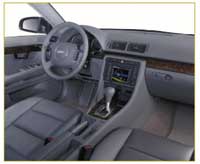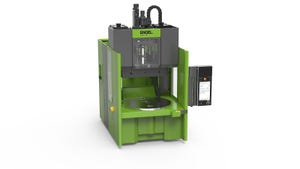Proven material learning new tricks in blends
SMA is positioned as an alternative to some entrenched materials, and lately also as a means to enhance those materials’ properties.
May 1, 2008
|
Styrene maleic anhydride (SMA) is hardly a new material, but one of the few suppliers of it, Polyscope, says it has "taught" the material a few new tricks that might make it of even greater interest to plastics processors across a broad swath of applications.
Polyscope in 2006 bought the SMA operations of DSM in Geleen, the Netherlands. Brittle alone, SMA has seen use in blends with, commonly, acrylonitrile butadiene styrene (ABS) for use in molded automotive parts. Although the firm still markets these SMA-based compounds, the focus now is to supply neat SMA (brand name Xiran) to compounders and plastics suppliers so they can use the material to improve the thermal performance, polarity, or compatibility of other thermoplastics, including ABS, PVC, and PMMA, says Peter Flippo, business development manager. By varying the maleic anhydride content and molecular weight in neat SMA, Polyscope can help users design and offer compounds that meet expectations but are not over-engineered. Increasingly, he notes, as large suppliers narrow their product ranges, processors often are left with the choice of either a "not-quite-good-enough" material or one with better-than-needed properties for which the processor will be charged.
With regards to thermal performance, SMA is already getting a long look from suppliers of PVC and additives for that material. One reason, notes Flippo, is the PVC industry’s ongoing transition from lead heat stabilizers to other stabilizers, for instance Ca/Zn. The lead-free alternatives typically drag down PVC’s heat strength by a few degrees below its Vicat B of 80ºC; the drop often is enough to make the material questionable for use in pipe fittings in lines that carry hot water. Blending PVC with Polyscope’s Xiran-brand SMA can raise the Vicat B to 100ºC or higher.
The supplier has tested and found that similar increases are possible with PMMA and ABS. Another example: Rather than purchase a high-heat ABS grade, processors can choose a standard material that, when blended with SMA, will meet the high-heat needs of an application at a lower cost. SMA is 100% miscible in PMMA so it does not affect acrylic’s transparency, but raises its glass-transition temperature by greater than 5ºC, a potential benefit in lighting and other applications in which PMMA is often used. Although PMMA suppliers typically offer high-heat versions of the material, Flippo says a number now are testing PMMA/SMA blends as a possible replacement for these.
Flippo cites polarity improvement as another benefit of SMA. The material’s intrinsic polarity means in most cases plastic surfaces need not be pre-treated to improve their adhesion for paints, coatings, or other surface finishes. As a result, he says potential users are considering ABS/SMA blends as a possible replacement for ABS or PC/ABS in painted automotive applications. SMA also can be used to boost compatibility in glass- or natural-fiber-reinforced compounds.
The material already is commercial in several automotive applications, including as the carrier layer on a dashboard, as well as for applications in other industries, such as its use as a coating for high-gloss paper.
Polyscope Polymers BV, Geleen, the Netherlands; +31 46-4763-989; [email protected]; www.polyscope.eu
RESINS/COMPOUNDS
Specialty TPVs bond with cold PA inserts
Two new grades of Santoprene thermoplastic vulcanizates (TPV) are able to bond with nylon in cold insert over-molding applications. The B500-grade family, in both colorable and black varieties, provides strong adhesion with nylon to offer high temperature resistance in such applications as power tools, kitchen appliances and utensils, furniture, sporting goods, and automotive parts. They offer long-term sealability, a durable slip-resistant feel, good compression set, and resistance to chemicals, oil, and heat. Bill Ramsey, market segment manager at the producer, says the B500 grades enable overmolds as thin as 0.5 mm to be achieved. The grades have hardness values of either Shore A 60 or Shore A 75. Ramsey says prior to these grades processors were often confronted with having to do two-shot molding to achieve a similar effect. “The latest addition to our bonding-grade portfolio has been developed to provide molders with more economical processing options and to allow designers more flexible creativity,” Ramsey says.
ExxonMobil Chemical, Houston, TX, U.S.A.;+1 281-870-6607; www.exxonmobilchemical.com
No slip thanks to TPU’s properties
Dutch hand tools processor Beargrip (Ruinen) has launched its ClipPac bit set with a bit holder molded of Desmopan grade 487 thermoplastic polyurethane (TPU) from this resin producer. The part was developed in cooperation with MMID, a design team in the Netherlands. The TPU ensures that the bits are held securely in the holes without slipping. Beargrip claims the holes won’t increase in size even when the tool is in constant use due to the low compression set and good abrasion resistance of the material. The complete subassembly is injection molded using hard/soft technology in a two-component mold. The hard part is a blend of polycarbonate and ABS. Desmoplan 487 has a Shore A hardness of 86, features good haptic properties, and resists oil, grease, detergents, and weathering.
Bayer MaterialScience, Leverkusen, Germany; +49 221-9902-160; www.bayermaterialscience.com
Glass fibers impart extra strength
Stamax 50YM240 is an injection molding-grade polypropylene (PP) reinforced with 50% long-glass fiber. The glass fibers, with an average length of 12 mm, are chemically coupled to the PP homopolymer matrix, which results in high stiffness and strength. This material also has improved flow properties. Tensile strength at room temperature is 120 MPa while elongation at break is 1.8%. Charpy notched impact is rated at 23 kJ/m2 at 23°C while the unnotched impact is 47 kJ/m2. The material is intended for underhood components that need to exhibit strength and resist heat degradation.
Sabic Europe, Sittard, the Netherlands;+31 46-722-2381; www.stamax.com
Balanced properties promised
Vydyne 21SPF is a non-reinforced nylon 6.6, available in either natural for coloring or black, and targets injection molding of such applications as bearings, bushing, cams, terminal blocks, electrical connectors and housings, as well as cable ties and tie straps. The resin is said to offer a combination of high strength, rigidity, toughness, good surface lubricity for mold release, and a high melting point. For underhood applications it provides good resistance to abrasion, chemicals, solvents, fuel, and oil. Initial color is said to be good, as well as the color retention when using regrind. The manufacturer says that in many applications the mold cycle can be reduced because parts are removed from the cavity at high temperature without experiencing warp or shrink. Processors can often reduce or totally eliminate the need for mold release sprays because of the material’s self-lubricating characteristics. In wall thicknesses from 0.4-3.0 mm it meets UL94 flammability class tests and is rated as V2.
Solutia Inc., St. Louis, MO, U.S.A.;+1 888-927-2363; www.vydyne.com
Heat, performance improved with blend
A proprietary range of blended polymers combining high-temperature mechanical performance and dimensional stability is offered in the MAX series. These grades take advantage of polyetheretherketone (PEEK) supplied by this polymer producer and Extem UH thermoplastic polyimide (TPI) from Sabic Innovative Plastics. MAX-series materials, including two new grades, M1000 and M2000, address the challenges of performance temperature ranges of 150-275°C. These melt-processable, unfilled grades are said to offer high purity, chemical resistance, and controlled coefficient of thermal expansion. They are finding applications in underwater electrical connectors, seal rings, and semiconductors.
Victrex Europe, Hofheim, Germany;+49 6192-9649-0; www.victrex.com
Processor eliminates unwanted thermal bridge
Last month, German window builder and profile processor aluplast (Karlsruhe) used the world’s largest window and door fair, Fensterbau/Frontale 2008 (Nuremberg, Germany), to launch a new window system that is said to exhibit high thermal insulation and cost effectiveness. To achieve an improvement of up to 20% in thermal insulation the processor is using a glass-fiber-reinforced Ultradur polybutylene terephthalate (PBT) grade from BASF in the vinyl Ideal 4000 profile line to replace steel supports, which have a high thermal conductivity and are normally used in plastics window frames. The use of PBT improves the heat-insulating features without changing the mechanical properties of the windows. PBT also helps aluplast to eliminate steel assembly by extruding two flat strips of Ultradur into the window profile. These permit a 60% weight reduction and allow easier installation.
BASF, Ludwigshafen, Germany; +49 621-607-8780; www.basf.de/ultradur
SEMIFINISHED PRODUCTS
Variety of colors offered in acrylic
Acrylic (PMMA) sheet is available in a variety of colors and thicknesses for a number of needs. Altuglas Black, in velvety, caviar, and diamond tones, is finding demand for luxury goods and fashion design. The material can be used for luxury fittings, staircases, fashion-show catwalks, arches and balusters, point-of-sales stands, and display-case frames. The sheets comes in a range of thicknesses with a single-matte or double-gloss surface. They can be thermoformed and bent without exhibiting stress whitening. Also available are acrylic sheets in the Altuglas Thick collection, which have become a glazing material of choice for water-sports activities and aquaria. The producer offers a selection of transparent, translucent, and pigmented thick sheets from 10-100 mm. Also available is Altuglas White, offering opaque panels that contrast with many other colors. One version diffuses up to 82% of transmitted light.
Arkema, Colombes Cedex, France; +33 1-49-00-83-96; www.altuglasint.com
Composite enhances car body, saves weight
BMW Tier-One supplier Takeo GmbH Automotive Systems (Dietfurt, Germany) is using a lightweight composite, SymaLITE, based on polypropylene and specially oriented glass fibers from this manufacturer as underbody shields for the new M3 model. The lightweight panels cover most of the underside of the car, offering improved aerodynamics, handling, acoustical properties, and fuel efficiency. The pre-oriented fibers within SymaLITE allow good loft behavior during heating and molding, giving expansion of up to six times the original thickness. The processor is able to achieve densities of only 0.3 g/cm3, while increasing bending stiffness in the z-direction, says Karl-Heinz Kalmbach, leader business line exterior and structures at the composites producer. The application is specified for engine, gearbox, and underbody shielding, and helps prevent corrosion of the M3.
Quadrant Plastic Composites, Lenzburg, Switzerland;+41 62-885-8448; www.quadrantcomposites.com
Specialty plastics can take the heat
CEPLA standard shapes for finishing are made of heat-resistant aromatic polyimide, produced through condensation polymerization. Besides withstanding temperatures up to 500°C, the shapes offer good mechanical properties, radiation and chemical resistance, and are not prone to absorbing moisture. The material also provides good electrical properties over a wide temperature and frequency range. CEPLA shapes are finding applications in welding tools, high-temperature reactor transports, insulation and semiconductor parts, etching equipment, and aerospace. Standard sizes of circular boards are available from 75-300 mm in diameter and thicknesses from 10-50 mm. Square boards come in 100-by-100-mm to 300-by-300-mm dimensions and the same thicknesses.
Suzuko Corp., Yokohama, Japan; +81 45-231-3455; www.suzuko.co.jp
About the Author(s)
You May Also Like



